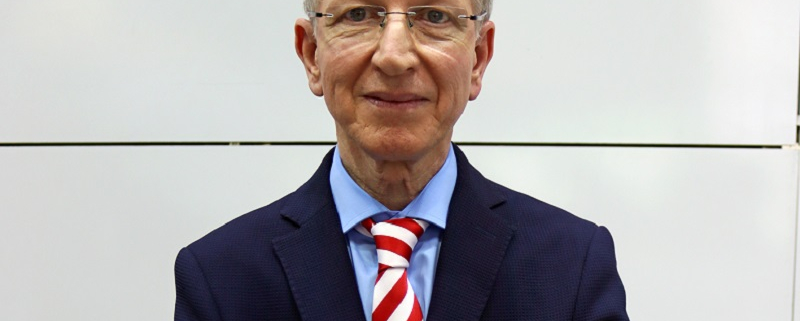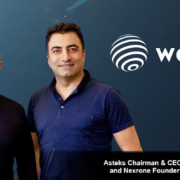Asteks will Carry Its Market Success in 2022 Even Further in 2023
Asteks, a specialist in advanced apron, cots and cot grinding machines, completed 2022 with a successful year. Strengthening its power in the Turkish market with its wide product portfolio and fast service, Asteks achieved significant growth in export markets despite the regional problems. The company, which has become one of the indispensable partners of yarn manufacturers with smart and technical solutions developed with intensive R&D studies in recent years, has a strong market expectation for 2023.
Asteks Marketing and Sales Manager Sabri İlknur, who made market evaluations for our Tekstil Teknoloji magazine for 2022,
stated that the targeted turnovers were achieved in domestic and international markets and that all marketing processes were planned in line with the growth trend and commented on 2022 market evaluations as the following; ‘‘After the devastating pandemic outbreak that started in 2020, there was a serious transformation in the textile industry as in all sectors. As Asteks, we successfully continued our work under these new ‘normal’ conditions and we never lost touch with the market by quickly adapting to these conditions. In this way, neither 2020 nor 2021 were lost years for us. In 2022, despite the political, social and economic problems that developed in our region, we carried our performance even further thanks to the measures we took. As Asteks, I am pleased to say that we have further increased our share in the domestic market. Becoming the most important apron, cots and grinding machines manufacturer of the Turkish textile industry also shows the trust in us.’’

Regional crises did not hinder our operations in foreign markets
Noting that the share of foreign markets in Asteks’ turnover increases every year, Sabri İlknur said that reaching many different textile markets gives them an advantage. Stating that many industries and companies were caught unprepared for the Russia-Ukraine de facto conflict that started in the first quarter of 2022, İlknur continued his statements as follows: ‘‘However, we managed to maintain our strength with our existing sales and marketing units and dealers in the markets we sell to. Our activities in Central Asia, especially Uzbekistan, and Asian markets such as Bangladesh and Pakistan have increased. In fact, the share of exports increased even more during the temporary contraction in the domestic market due to exchange rate fluctuations and rising costs. We can already say that most of our production will go to existing and new markets in the medium and long term.’’
Explaining that in 2022, they increased their capacities in line with the demands from yarn manufacturers, İlknur conveyed that spinners want more competitive and high quality products in terms of price. Explaining that Asteks, as a 100% domestic brand, brings competitive products to the market in the global market, İlknur added; ‘‘Fluctuations in increasing raw material prices also affect our production processes, but we have taken the necessary steps to ensure that this does not reflect negatively on our quality. In this way, we continued to offer our price-performance-oriented, high quality and long-lasting aprons and cots that textile manufacturers need in this period in the fastest way possible.’’


The textile industry is digitalizing while becoming more sustainable
Sabri İlknur said that the transformation in the textile industry in the last decade has been shaped on the axis of sustainability, and in this context, ‘digitalization’ and ‘smart factory’ concepts have started to come to life. Explaining that the impact of textile on nature has been discussed for many years and that environmentally friendly and sustainable solutions have started to be realized in this regard, İlknur noted that many topics from the use of natural resources to energy saving, from recycling to upcycling have now become topics of interest for end consumers.
İlknur shared the following important details; ‘‘The textile industry has always been discussed with its intensive use of natural resources and energy consumption, as well as the waste it creates. The new solutions developed inspire us to transform into a greener industry to combat the climate crisis. As Asteks, we are developing in line with this process from our production to our products. Every year, we focus on minimizing our waste level and producing at an optimum level by using less material with smart production methods. We have EIA Provincial Compliance and Zero Waste Certificate and we continue our activities within this framework. Hazardous/non-hazardous wastes are delivered to licensed recycling companies after temporary storage. In production, we use certified rubber raw materials and chemicals suitable for recycling. Rubber, waste and waste powders generated during the production phase are given to the recycling process to be used as filling material in different sectors. We make investments to reduce the energy we need in production and train our personnel on energy saving. In short, we will continue our efforts for more sustainability with a corporate perspective in the coming period.’’
‘‘Machines that communicate with each other, processes that operate without human intervention are becoming the reality of the textile industry,’’ said İlknur, arguing that durable, high quality and long-lasting equipment will be needed more than ever in the new period. İlknur shared the following; ‘‘Now, with Industry 4.0, there are processes carried out in the dark with unmanned machines. Although this stage has not yet begun to be used in the entire industry, it seems that this is where we are heading. Therefore, long-lasting, durable and standardized parts and equipment are required. As Asteks, we contribute to facilitate the costs, quality and production processes of spinning mills with the apron and sleeve types in our portfolio. With our cots that get dirty later, last longer against abrasion, need less grinding, and do not deteriorate in quality after grinding, both operating costs are reduced and yarn quality can be controlled more stably.’’

401-SF&M cots grinding machine doubles productivity
The R&D department within Asteks develops innovations within the framework of the increasing and diversifying needs of the textile industry. The projects carried out by the expert and competent engineer team with ‘interdisciplinary’ work are rapidly bearing fruit. One of these products, the 401-SF&M cot grinding machine, has attracted great interest both in Turkey and in the global market.
Stating that this cot grinding machine has two independent grinding units, Mesut Yüksel, R&D and Technical Support Engineer at Asteks, explained that the efficiency demands from the enterprises were taken into consideration in the development of the model. Yüksel shared the following details about this solution; ‘‘Thanks to two independent grinding units, two different processes can be performed at the same time. In addition, thanks to the hopper feeding system, the cots enter the system automatically without the need to sort the cots one by one. In addition, with the automatic unmanned grinding feature, the diameter separation of the cots to be ground is performed automatically, thus preventing manual errors. In addition, additional optional solutions that we have developed for the grinding of different diameter cots required in synthetic and blend mills can also be applied to the 401-SF&M cots grinding machine.
401-SF&M cot grinding machine provides significant advantages to the investment and operating costs of yarn manufacturers with its unique design and ease of operation. For this reason, 401-SF&M became the best-selling solution of 2022 and the flagship of our portfolio.’’
Offering solutions that add value to the textile industry, Asteks aims to expand its portfolio and reinforce its market leader position by developing new products with this vision in the coming period.











